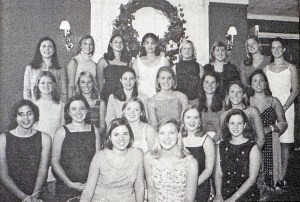GOP delegates divided on what their job is
Published 10:52 pm Wednesday, April 27, 2016

- Regional library director to retire
WASHINGTON — Melissa Proffitt hoped Ohio Gov. John Kasich would win Indiana’s Republican primary — and not just because she thinks he stands the best chance to win in the fall.
A Kasich victory would have made her life a little easier.
Trending
Indiana Republicans — and those in states including Pennsylvania, Georgia and Kentucky — require their delegates to the party’s national convention to support, on a first vote, the candidates whom voters chose back home.
But even as Republican front-runner Donald Trump continues to build momentum with victories in five states Tuesday night, he may not gather the 1,237 delegates needed to wrap up the nomination on a first vote.
In the second and subsequent votes, most of the convention’s 2,472 delegates would be released to support whomever they want. The prospect of that has created a philosophical divide over the delegate’s role.
Interviews and emails with more than a dozen delegates selected to represent Republicans from Indiana, Georgia and Kentucky reveal the division.
Some believe they’re charged to consider the voters’ choice, certainly, but ultimately to exercise their best judgment.
Some Indiana delegates, including Proffitt, say what’s best for the party is not Trump, and they’re leaning toward Kasich.
Trending
In Georgia and other states, some delegates say Texas Sen. Ted Cruz is best for the party.
Proffitt noted national polls that show Kasich beating Democratic front-runner Hillary Clinton in a hypothetical match-up in November, while Trump and Cruz trail her.
“It makes no sense to me to nominate someone who’s going to be cannon fodder,” said Craig Dunn, a delegate from Kokomo, Ind., who also leans toward Kasich on a second ballot.
While their decision might be easier if Kasich wins Indiana next week, chances of that have grown slim. Kasich announced last weekend that he’s no longer campaigning in the state, as part of a strategy with Cruz to coordinate efforts in hopes of blocking Trump from getting a first-ballot victory and forcing a contested convention.
Other delegates, however, said their role is to reflect the will of voters.
“We are elected to represent, not redefine,“ said Carol McDowell, a delegate from Indiana’s 2nd Congressional District, which includes Goshen and South Bend.
The delegate debate has caused deep resentment from Trump supporters, who may see delegates from states he won switch allegiance and hand the GOP nomination to someone else.
Thomas John, another Indiana delegate, said he and others received foreboding messages after expressing their concerns about Trump and saying they may vote for Kasich after the first round of voting.
“How’s the family?” read one email John received. “The house looks beautiful, it’s come a long way.
“Buck up and fight for the will of the people … or go into hiding,” continued the email, which was signed “The People.”
Dunn said someone posted on his Facebook page: “If the delegates don’t pick the right candidates, the delegates need to be cleansed.”
Rep. Todd Rokita, R-Ind., a member of the state’s delegation, noted the selection of a nominee at a convention is different from electing someone to office.
Voters’ wishes are reflected in the first ballot. If that doesn’t produce a clear winner, Rokia said in an interview, it’s up to delegates to vote for what they believe to be the best interests of the party.
As a practical matter, he said, delegates should not be obliged to vote for the same candidate in subsequent rounds.
“We’d just keep voting, but nothing would ever get decided,” he said.
B.J. Van Gundy, a delegate from Georgia’s 7th Congressional District, northeast of Atlanta, also questioned the logic of not budging from one’s original choice.
“What do they say? The definition of insanity is to do the same things over and over and expect different results,” he said.
Indiana state Rep. Alan Morrison, a Trump supporter, said watching delegates come out against candidates even before the state’s primary next week has only made voters more disillusioned by politics.
Many Indiana delegates, chosen earlier this month, support the Ohio governor who is no longer competing in the state.
“I wouldn’t want to be a delegate who has to explain to my neighbor why I’m voting for someone who did not take the time to even campaign and come and speak to the voters of Indiana,” Morrison said.
Proffitt said she can be swayed by arguments at the convention, but she also defended the deal between Kasich and Cruz.
“This decision regarding Indiana is a strategy to get to an end,” she wrote in an email. “And the end is the general election. Kasich is the only one who can beat the Democrats in November.”
John left open the possibility of voting for Trump at the convention despite what he called “grave concerns.”
He said he might vote for Trump on a later ballot but only “if we get to July and he’s proven that he has a path to winning the general (election), and he’s ameliorated some of the xenophobic and angry rhetoric that concerns me.”
Joseph Brannan, chairman of the Republican Party in the 2nd Congressional District in southwest Georgia, said he and the two other delegates from the district will cast votes at the convention that reflect the state’s election results.
The trio will cast two votes for Trump and one for Cruz — no how many rounds the voting goes. One delegate, a Trump supporter, will cast one of the votes for the Republican front-runner. Brandon and the other delegate will flip a coin to see who casts the other Trump vote.
Brannan said delegates may have the freedom to make their own decisions at the convention. But the voters spoke in the primaries, he said, “and it’s difficult in my mind to deviate from that too much.”






